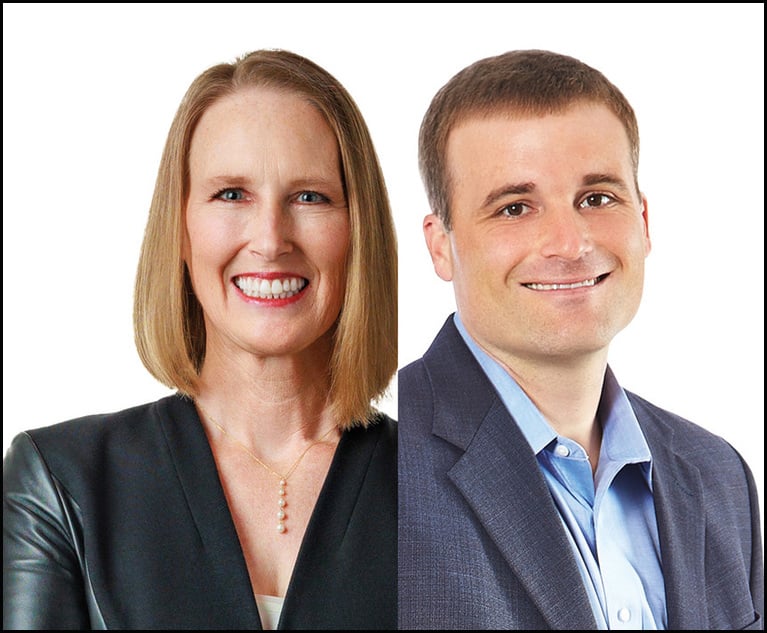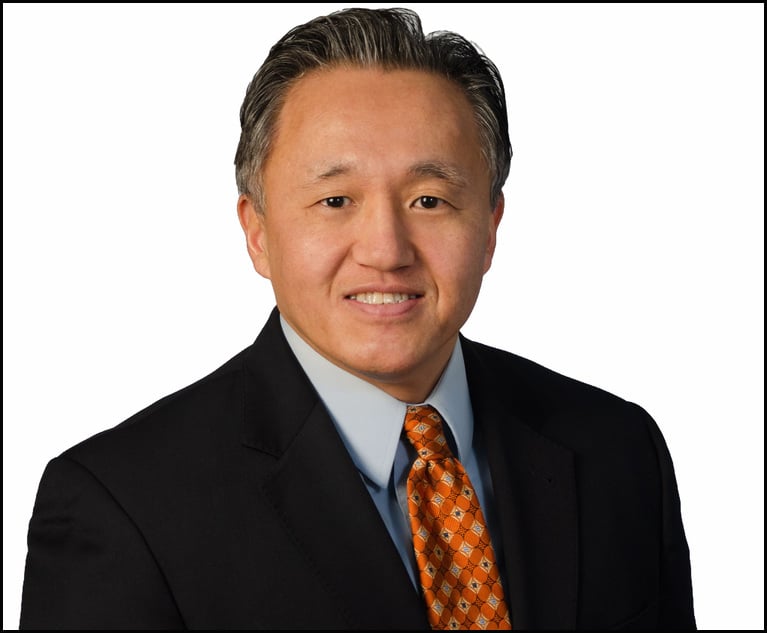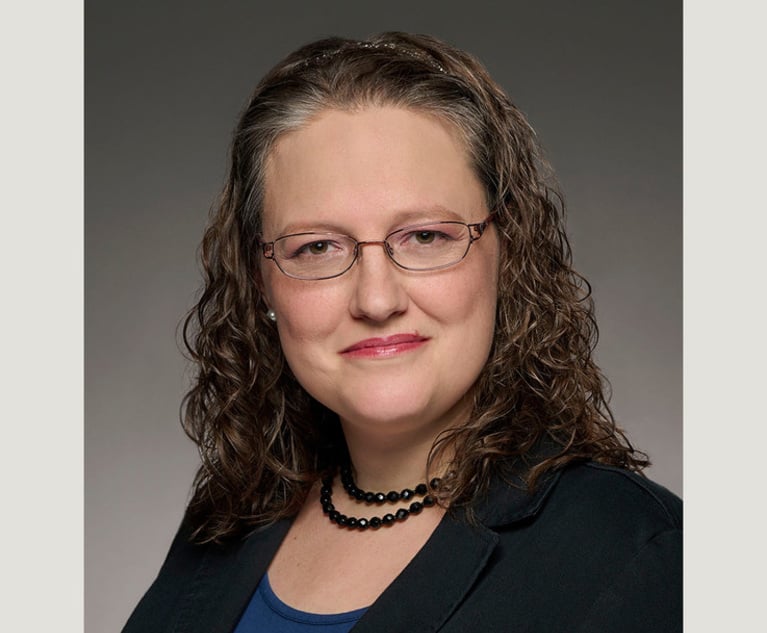Stark Wipes Out $2.5 Billion Verdict in Hep C Drug Patent Case
A Delaware federal judge on Feb. 16 overturned a massive $2.5 billion jury verdict against Gilead Sciences Inc., finding that a patent held by a unit of Merck & Co. Inc. was too broad to be valid.
February 20, 2018 at 03:46 PM
4 minute read
 Photo Credit: Fotolia
Photo Credit: Fotolia A Delaware federal judge on Feb. 16 overturned a massive $2.5 billion jury verdict against Gilead Sciences Inc., finding that a patent held by a unit of Merck & Co. Inc. was too broad to be valid.
The ruling from U.S. District Chief Judge Leonard P. Stark of the District of Delaware reversed a federal jury's finding in 2016 that Gilead had willfully infringed on Idenix Pharmaceutical's patent, which discloses a “groundbreaking” treatment for hepatitis C. The verdict was the largest-ever reported in a patent, according to defense counsel in the case.
In a 50-page opinion, Stark wrote that the patent failed to meet a requirement that it disclose how to make and use the treatment without undue experimentation. Stark called the evidence Gilead presented during a 10-day trial “devastating,” and he said no reasonable jury could have found Idenix's patent valid.
“As a matter of law, based on the undisputed facts and the facts that, although disputed, a reasonable factfinder would have to have found (by clear and convincing evidence), the '597 patent is invalid due to lack of enablement,” Stark said, granting Gilead's motion for judgment as a matter of law on validity.
Merck said in a statement that the result did not reflect the facts of the case and vowed to take an appeal to the U.S. Court of Appeals for the Federal Circuit.
Meanwhile, Gilead's multi-firm team of attorneys from Orrick, Herrington & Sutcliffe, Fish & Richardson and Irell & Manella celebrated the ruling, as they prepare for the inevitable appellate fight.
“I'm particularly proud to be affiliated with Gilead, which never wavered in the face of extraordinary pressure, and whose in-house lawyers were integrally involved at every step,” Orrick partner Josh Rosenkranz said in a statement. “We look forward to working with the same team to defend this win on appeal.”
Merck subsidiary Idenix sued in 2013 over Gilead's blockbuster hepatitis C drug sofosbuvir, which is marketed under Sovaldi and other brand names and has been credited with saving millions of lives from the viral disease. It has also led to billions of dollars in revenue for the Foster City, California-based Gilead.
Sofosbuvir was developed by Pharmasset Inc. and later acquired by Gilead. According to Idenix, Pharmasset founder Raymond Schinazi stole the idea of using “two-prime (2')-methyl up modified nucleosides” to treat hepatitis C, or HCV. The company said Pharmasset chemist Jeremy Clark then used Idenix's patent application to develop his breakthrough 2'-methyl up 2'-fluoro down compound that became sofosbuvir.
Jurors in Stark's court rejected Gilead's challenges to the patent's validity and awarded Idenix $2.54 billion in damages at the close of a trial in December 2016. They also found that Gilead had acted willfully, opening the door to treble damages in the case. According to Delaware Law Weekly affiliate The Recorder, Idenix had asked Stark to “at least double” the award to more than $5 billion.
Stark upheld the jury's finding of willfulness in September. But he declined to enhance the damages, sounding a note of skepticism at the jury's findings.
“If the only thing Pharmasset/Gilead did was to 'deliberately copy' Idenix's discovery that a 2'-methyl up modified nucleoside could be effective in treating HCV, that was not nearly enough to arrive at sofosbuvir,” he wrote at the time.
On Feb. 16, Stark said the scope of the patent's claims included “many thousands,” if not billions, of compounds, which would have required “extensive” experimentation in order to synthesize the patented compound. And given the “novelty and infancy” of the field, it would be impossible for a person of ordinary skill to visualize all the embodiments of the claims.
“Hence, a reasonable factfinder could only reach one conclusion: that the range of 1
potential candidates is and was substantial, and that testing played an indispensable and
exploratory—rather than confirmatory—role in a POSA's attempts to practice the patent's
claims,” he said.
Idenix was represented by attorneys from Jones Day and Ashby & Geddes.
The case is captioned Idenix v. Gilead Sciences.
This content has been archived. It is available through our partners, LexisNexis® and Bloomberg Law.
To view this content, please continue to their sites.
Not a Lexis Subscriber?
Subscribe Now
Not a Bloomberg Law Subscriber?
Subscribe Now
NOT FOR REPRINT
© 2025 ALM Global, LLC, All Rights Reserved. Request academic re-use from www.copyright.com. All other uses, submit a request to [email protected]. For more information visit Asset & Logo Licensing.
You Might Like
View All
3rd Circ Orders SEC to Explain ‘How and When the Federal Securities Laws Apply to Digital Assets’
5 minute read
Womble Bond Dickinson's Wilmington Office Sees New Leadership as Merger Is Completed
4 minute read

Trending Stories
- 1Relaxing Penalties on Discovery Noncompliance Allows Criminal Cases to Get Decided on Merit
- 2Reviewing Judge Merchan's Unconditional Discharge
- 3With New Civil Jury Selection Rule, Litigants Should Carefully Weigh Waiver Risks
- 4Young Lawyers Become Old(er) Lawyers
- 5Caught In the In Between: A Legal Roadmap for the Sandwich Generation
Who Got The Work
J. Brugh Lower of Gibbons has entered an appearance for industrial equipment supplier Devco Corporation in a pending trademark infringement lawsuit. The suit, accusing the defendant of selling knock-off Graco products, was filed Dec. 18 in New Jersey District Court by Rivkin Radler on behalf of Graco Inc. and Graco Minnesota. The case, assigned to U.S. District Judge Zahid N. Quraishi, is 3:24-cv-11294, Graco Inc. et al v. Devco Corporation.
Who Got The Work
Rebecca Maller-Stein and Kent A. Yalowitz of Arnold & Porter Kaye Scholer have entered their appearances for Hanaco Venture Capital and its executives, Lior Prosor and David Frankel, in a pending securities lawsuit. The action, filed on Dec. 24 in New York Southern District Court by Zell, Aron & Co. on behalf of Goldeneye Advisors, accuses the defendants of negligently and fraudulently managing the plaintiff's $1 million investment. The case, assigned to U.S. District Judge Vernon S. Broderick, is 1:24-cv-09918, Goldeneye Advisors, LLC v. Hanaco Venture Capital, Ltd. et al.
Who Got The Work
Attorneys from A&O Shearman has stepped in as defense counsel for Toronto-Dominion Bank and other defendants in a pending securities class action. The suit, filed Dec. 11 in New York Southern District Court by Bleichmar Fonti & Auld, accuses the defendants of concealing the bank's 'pervasive' deficiencies in regards to its compliance with the Bank Secrecy Act and the quality of its anti-money laundering controls. The case, assigned to U.S. District Judge Arun Subramanian, is 1:24-cv-09445, Gonzalez v. The Toronto-Dominion Bank et al.
Who Got The Work
Crown Castle International, a Pennsylvania company providing shared communications infrastructure, has turned to Luke D. Wolf of Gordon Rees Scully Mansukhani to fend off a pending breach-of-contract lawsuit. The court action, filed Nov. 25 in Michigan Eastern District Court by Hooper Hathaway PC on behalf of The Town Residences LLC, accuses Crown Castle of failing to transfer approximately $30,000 in utility payments from T-Mobile in breach of a roof-top lease and assignment agreement. The case, assigned to U.S. District Judge Susan K. Declercq, is 2:24-cv-13131, The Town Residences LLC v. T-Mobile US, Inc. et al.
Who Got The Work
Wilfred P. Coronato and Daniel M. Schwartz of McCarter & English have stepped in as defense counsel to Electrolux Home Products Inc. in a pending product liability lawsuit. The court action, filed Nov. 26 in New York Eastern District Court by Poulos Lopiccolo PC and Nagel Rice LLP on behalf of David Stern, alleges that the defendant's refrigerators’ drawers and shelving repeatedly break and fall apart within months after purchase. The case, assigned to U.S. District Judge Joan M. Azrack, is 2:24-cv-08204, Stern v. Electrolux Home Products, Inc.
Featured Firms
Law Offices of Gary Martin Hays & Associates, P.C.
(470) 294-1674
Law Offices of Mark E. Salomone
(857) 444-6468
Smith & Hassler
(713) 739-1250






